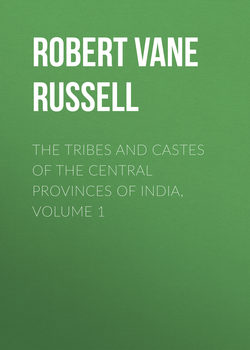Читать книгу The Tribes and Castes of the Central Provinces of India, Volume 1 - Robert Vane Russell - Страница 47
Part I.
Introductory Essay on Caste
Introductory Essay on Caste
44. Caste occupations divinely ordained
ОглавлениеOccupation is the real determining factor of social status in India as in all other societies of at all advanced organisation. But though in reality the status of occupations and of castes depends roughly on the degree to which they are lucrative and respectable, this is not ostensibly the case, but their precedence, as already seen, is held to be regulated by the degree of ceremonial purity or impurity attaching to them. The Hindus have retained, in form at any rate, the religious constitution which is common or universal in primitive societies. The majority of castes are provided with a legend devised by the Brāhmans to show that their first ancestor was especially created by a god to follow their caste calling, or at least that this was assigned to him by a god. The ancestors of the bearer-caste of Kahārs were created by Siva or Mahādeo from the dust to carry his consort Parvati in a litter when she was tired; the first Māng was made by Mahādeo from his own sweat to castrate the divine bull Nandi when he was fractious, and his descendants have ever since followed the same calling, the impiety of mutilating the sacred bull in such a manner being thus excused by the divine sanction accorded to it. The first Māli or gardener gave a garland to Krishna. The first Chamār or tanner made sandals for Siva from a piece of his own skin; the ancestor of the Kāyasth or writer caste, Chitragupta, keeps the record of men’s actions by which they are judged in the infernal regions after death; and so on.
